#My Beautiful Leah
Photo
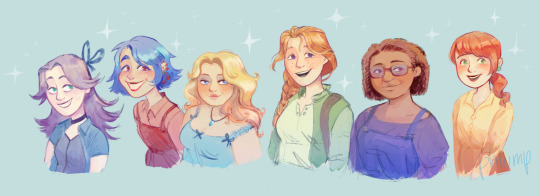
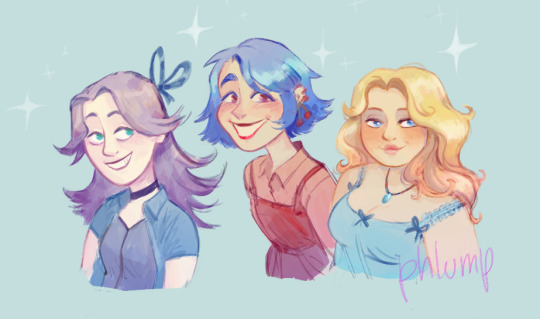

the town bisexuals are at your door it is time for you to pick a bride
#ngl lads i am not happy with this one lmfao#been going thru it so just a doodle#anyway so these are just design ideas#penny is this mousey little woman i see as actually kinda tallish but the kind of tall person who does everything to not appear so#maru is just hot tbh she my engineer wife#really tried something with her face and hope it doesnt look horrible#leah is tall as well and you know shes ripped under that shirt#she'll carry you over the threshold and paint your ceiling like the sistine chapel and dedicate it to you#i am not happyy with how haley came ouuttt she deserves better#like i couldve drawn her beautiful hair good but instead i just didnt. whatver#emily still the love of my life its been established#i cant see abigail as a romantic option ngl i perceive her as an impish quasi teenager who likes getting in trouble#i would be her parent figure and give her life advice and bring her to the mines to fight monsters together#anyway peace#sdv#stardew valley#abigail sdv#emily sdv#haley sdv#leah sdv#maru sdv#penny sdv#stardew valley bachelorettes#art by op
2K notes
·
View notes
Text
i love fanartists but if ur gonna draw black annabeth pls don’t white wash her beyond belief. she is dark skinned with dark hair. if u can’t handle drawing her as she is just stick with white annabeth pls <3
#i love it when i see black annabeth art#but half of it make her look like zendaya#and zendaya is beautiful but that’s not what annabeth looks like#leah sava jeffries is gorgeous as she is and that should be represented in art#breaking my silence#sorry if this seems rude#it’s just frustrating#annabeth chase#leah sava jeffries#percy jackson#percy jackon and the olympians#pjo tv show#pjo#rick riordan#fanart#annabeth chase fanart#lynx talks
201 notes
·
View notes
Text

The last thing I remember is collapsing on a wooden porch, looking up at a ceiling fan circling above me, moths flying around a yellow light, and the stern faces of a familiar-looking bearded man and a pretty girl, her hair curled like a princess’s.
- Percy Jackson in Book One: The Lightening Thief
#god it warms my heart that so many young black girls are going to see themselves portrayed as a hero#and to see the male lead fall head over heels for her at first sight#annabeth is a role model who is kind brave beautiful and intelligent#percy jackson#annabeth chase#percabeth#percy jackson and the olympians#percy jackson series#walker scobell#leah sava jeffries
63 notes
·
View notes
Photo


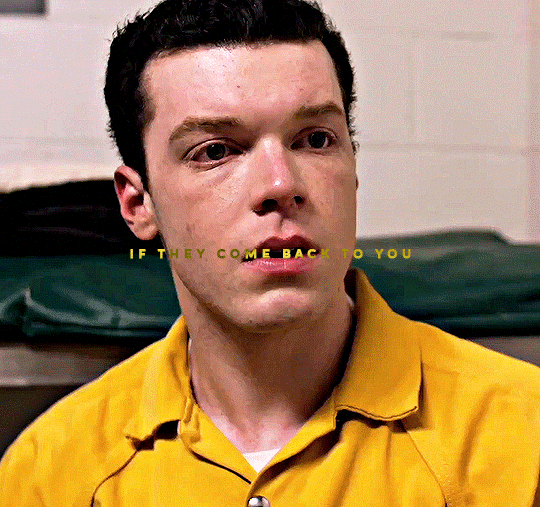
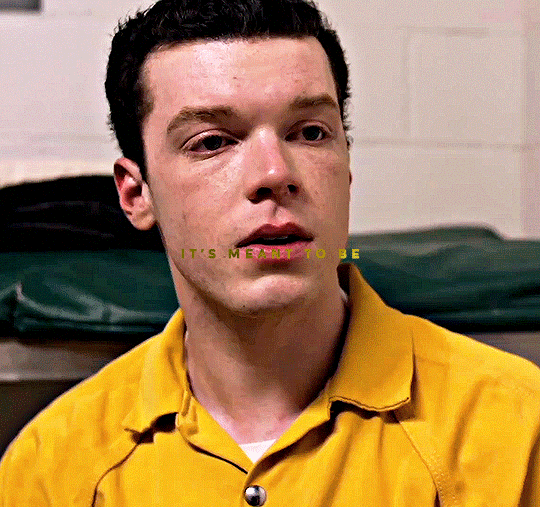
for @whatwouldmickeydo
#i have never opened ps so fast in my LIFE#leah and their beautiful brain ilysm#shameless#shamelessedit#shamelessnet#ian gallagher#things i made
377 notes
·
View notes
Text

farmer maureen over at ☀️ solstice farm ☀️
#my beautiful artist wife leah also lives there#and penny#and abigail#but also elliot#stardew valley#stardew valley oc#stardew valley fanart
24 notes
·
View notes
Text
Northern Lights
.
I heard a voice that cried, “Balder the Beautiful is dead, is dead!”
.
Who knows what to call the lonely exhilaration of gazing out into a bright Northern sky? Who can name it?
Jill could.
It was the same feeling that came to her at the teetering edge of a cliff at the end of the world. The same feeling as when she said her goodbyes to Puddleglum and Scrubb before they freed the prince. It was the same feeling that engulfed her now, sitting in the professor’s library with a volume of poetry before her.
.
The wild northern wastes were well named: utterly wild, perfectly desolate, and terribly Northern.
It was lonely there and often cold, but the sky was an endless whorl of gales and gray clouds. The stones were indigo under the pale winter sunlight, and at sunset they glowed a soft gold, as though lit from within. The gorges and moors lay before her, and Jill loved them for their vastness and their distance. Little grew in that country, but that which did was full of vigor. The grass was short and coarse. Every tree was victorious.
On a still, deep breathing winter night, Jill lay on her back beneath a covering sky. It seemed beautiful to her, rich and strong and glorious. Her eyes drank in the breadth of it until her tears began to blind her. Yet even then, she still couldn’t look away.
She felt bigger here in the wastes, like the landscape. Stronger, wider. The further she walked, the more she felt herself stretch out. One of these days, maybe, she would catch hold of herself at the edge and tug, and Jill Pole would open up clear as the Northern sky.
.
And through the misty air passed the mournful cry of sunward sailing cranes.
.
The thing that surprised Jill most about the battle with the serpent was this: there wasn’t any yelling. Always, it seemed, whenever she read stories about people fighting with swords, the combatants would let loose some guttural yell before their blows fell. They would scream and writhe in pain as they died. They would shout instructions to their fellows, “Look out!” or “Hit him there!” But the whole affair with the serpent passed with very little noise.
The poison-green coil constricted around the prince; he raised his arms and got clear, struck the serpent hard, and then Scrubb and Puddleglum dispatched the creature with heavy, hacking blows. The monster died writhing, but not screaming. And then it was over.
The thing that surprised Jill most about the moments before battle was, of course, the noise. She could hear her own heartbeat in her ears. She couldn’t stop listening to her own breathing. Every footstep rang out like a gong, and any words exchanged rang with a kind of finality that made them sound louder than anything.
“You are of high courage,” Rilian told her when it was over.
Yet the thing in Jill’s chest just then didn’t feel like courage. It was a deep breath, a plunge, and a release. It was loud and quiet all at once, till she was standing, blinking in the night air as snowballs whizzed round her, and maybe that was something like courage after all.
.
And now, there was a stirring in her chest as she reread the words on the page. Sing no more / O ye bards of the North / Of Vikings and of Jarls! / Of the days of the Eld / preserve the freedom only / nor the deeds of blood!
She thought of grief. Of freedom.
The lonely ache in her belly grew stronger. She felt herself uplifted into the huge regions of sky that were just beyond those cliffs, weightless as the breath beneath her buoyed her up, further, further…
.
When she saw Caspian up close, Jill thought that he looked like the sort of person who was meant to live in a castle. A silly thought, perhaps, since she knew he was a king– only she wasn’t thinking of Cair Paravel. No, Jill was picturing the ruins of an old British castle she’d visited once on holiday. She still remembered how the stonework had loomed over her, all towering arches and crumbling walls. That was where Caspian seemed to belong. He had an air of ancient tragedy about him.
When Rilian disappeared, all things had wept but one. The serpent coiled beneath the earth and flicked its forked tongue, spewing poison.
Now, the king half rose to bless his son. He whispered a few words as he caressed Rilian’s cheek, words meant only for those beloved ears. Jill saw Caspian’s lips move and wondered what a man like that could possibly say, when time ran so short.
.
They laid him in his ship, with horse and harness, as on a funeral pyre. Odin placed a ring upon his finger, and whispered in his ear.
.
Jill furtively took Myths of the Northmen and held it up to the professor with a question in her eyes. She was still shy around him and Miss Plummer, though she wished she wasn’t.
“Would you like to take that with you?”
“...Please.”
.
It takes a certain kind of person to be exhilarated by the heights. You’ve got to love vastness more than you fear falling.
.
They walked to the train station with an autumn wind blowing hard, and though Jill couldn’t fathom why, she turned and saw Lucy grinning, fierce and joyful– grinning and reaching a hand out towards her friend.
Jill reached back and grabbed it. “What will you do, once we’re back in Narnia?” she asked.
The wind blew harder. The feeling of anticipation grew and grew, until it felt so big that she couldn’t dream of containing it. And there was Lucy, holding Jill’s hand and laughing like it was easy.
.
Preserve the freedom only, not the deeds of blood!
.
The second time Jill went to Narnia, she found herself not at its edge, but at its end.
The thing about the Norse apocalypse is: it feels believable. It doesn’t reach beyond earth’s horizon to pull down hope beyond hope. It’s only the kind of courage that hopeless humans have: you are going to die, so you might as well die bravely.
They found the last king of Narnia bound to a tree. His eyes were faintly red from crying, and his wrists and ankles red from the coarseness of his fetters.
In the Norse myths, Loki broke free of his fetters at the end of the world. He escaped to the helm of a ship made from the fingernails of the dead.
The last king of Narnia fell forward onto the ground when Eustace cut his bonds. Jill crouched down beside him and watched as he rubbed feeling back into his legs. He wasn’t so much older than her, she thought. Jill was sixteen years old; the last king of Narnia could not be older than twenty-two.
In the myths, the gods were ancient, hewn from the bodies of giants old as the earth.
Jill put out a hand and helped the last king of Narnia to his feet. Not for the last time, she shivered. Something deep inside her (deeper than her chest, than her heart, than the marrow of her bones, deep as her soul, deeper) was singing an elegy and she didn’t know why, or how, or where it had come from. The king clutching her hand, who could have been her older brother, would have no heir.
Yet when he asked, “Will you come with me?” Jill could only smile.
“Of course,” she said. “It’s you we’ve come to help.”
.
And the voice forever cried, "Balder the Beautiful is dead, is dead!"
.
“This really is Narnia at last,” murmured Jill. The springtime wood had little in common with the wintry lands she had traveled the last time she was here– but it awakened the same feelings of Northernness in her chest.
Their party may as well have been the only people in the world, for how isolated their little wooden path seemed. Yet it wasn’t lonely, really, cocooned in all that green with the wind in the leaves and the primroses nodding and blue of the sky peeking through above.
Jewel told stories about what ordinary life was like when there was peace here. As he spoke, Jill could almost hear the trees' voices speaking out of the living past, whispering, stay, stay. She was caught up to a great height, looking down across a rich, lovely plain full of woods and waters and cornfields, which spread away and away till it got thin and misty from distance.
“Oh Jewel–” Jill said with a dreamy sigh, “wouldn’t it be lovely if Narnia just went on and on– like what you say it has been?”
She needn’t be a queen, as Susan and Lucy had been, but Jill would’ve liked to stay. She would've liked it all to stay, if it could. She might have been a woodmaid in a place like this: with the turn of the seasons, the swaying trees, swords into plowshares. Oh, if only she could stay!
Ahead, the last king of Narnia was softly singing a marching song. Jill tilted her head back and let warm shafts of sun caress her face.
.
I saw the pallid corpse of the dead sun borne through the Northern sky.
.
“So,” said the last king of Narnia, “Narnia is no more.”
He tried to send them back. Jill shook her head. It was very loud and very quiet. “No, no, no, we won’t. I don’t care what you say. We’re going to stick by you whatever happens, aren’t we Eustace?”
They couldn’t go back anyway. Neither would they flee, not south across the mountains nor North into the great wide wastes. No, they would stay. They slept in a holly grove on the edge of ruin, waiting for the bonfires to light.
Jill slept fitfully, but in between she dreamed. She was high up in the air, buffeted by clouds and pierced by shafts of silver sunlight.
.
They all died, in the myths. Jill knew that. It seemed beautiful and brave when she read it in her book, tucked away safe in the Professor’s library. It was terrifying now– and yet it was beautiful and brave still.
The dogs came bounding up, every one of them, running up to the king and his men with their tails wagging. One of them leapt at Jill and licked her face, tongue roughly lapping up the sweat and tears that had dried on her cheeks.
“Show us how to help, show us how, how, how!” the dogs were barking, almost ebullient in their enthusiasm. Jill bit back a sob. How lovely, she thought. How terribly beautiful. How dreadfully brave.
.
So perish the old Gods!
.
The white rock gleamed like a moon in the darkness when Jill finally reached it. She ran back to it alone, her hands shaking, while her friends stayed forward with their gleaming swords and Jewel’s indigo horn.
The while rock gleamed like the moon. Jill’s first shot flew wide and landed in the soft grass. But she had another arrow on her string the next instant. It was speed that mattered, not aim. Speed, and turning aside when she cried, so as not to drip tears on her bowstring.
The white rock gleamed. In the myths, a wolf devoured the moon. Peter’s wolf, slain many thousand years ago in this world, opened his jaw wide and darkness fell over everything.
Her next arrow found its mark. After that, she lost track. She pulled, and she prayed that her hands kept still another minute.
The unique thing–maybe the appealing thing–about the Norse myths, was that they told men to serve gods who were admittedly fighting with their backs to the wall and would certainly be defeated in the end. Jill let loose another arrow, felt the white rock at her back, and she knew that the clawing fear–beauty–bravery deep in her gut was the same feeling that she felt on the heights. The same feeling, but a different face. You’ve got to love vastness more than you fear falling.
.
“I feel in my bones,” said Poggin, “that we shall all, one by one, pass through that dark door before morning. I can think of a hundred deaths that I would rather have died.”
“It is indeed a grim door,” said Tirian. “It is more like a mouth.”
“Oh, can’t we do anything to stop it,” said Jill. Better to be dashed to the ground than it was to be devoured.
“Nay, fair friend,” said Jewel. “It may be for us the door to Aslan’s country and we sup at his table tonight.”
A hand tangled itself in her hair and started to pull. Jill braced herself hard, for a moment, until her strength gave out. She was standing on the edge of a high, Northern cliff. She took another step, and fell.
.
Perhaps when the moment comes, our bite will prove better than our howls. If not, we shall have to confess that two millennia of Christianity have not yet brought us to the level of the Stoics and Vikings. For the worst (according to the flesh) that a Christian need face is to die in Christ and rise in Christ; some were content to die, and not to rise, with Father Odin.
.
The world inside the stable was beautiful. It made Jill’s chest ache in all the loveliest ways.
.
Build it again, O ye bards, fairer than before!
#okayyyy so#i've been down the tolkien/lewis/norse mythology rabbit hole lately#it's a lot#but i've been picking at this piece in my head for a while now#which is more a rhapsody than anything else#but another for my narnia/classic lit sequence of pieces#the quotes are mostly pulled from Longfellow's Tegners Drapa translation#which Jack discusses in Surprised by Joy as one of the works that inspired feelings of joy and 'Northernness' in his boyhood#there's also a Weight of Glory quote in there#(paraphrased)#and one from the intro to Joy Gresham's book on the 10 Commandments that Jack wrote#(that's that last passage in italics)#i'm not really sure i was trying to make a point with this so much as just. explore that feeling of northernness#bc really northernness is two things#it's joy and exhileration brought on by beauty#and it's that beautiful hopeless courage when faced with unwinnable battles#and i love how intertwined those two things are for lewis#and let's be honest for me too#so that's what this is#hope it holds together okay#narnia#chapter one#night under narnia#dying of thirst#pontifications and creations#leah stories
22 notes
·
View notes
Text
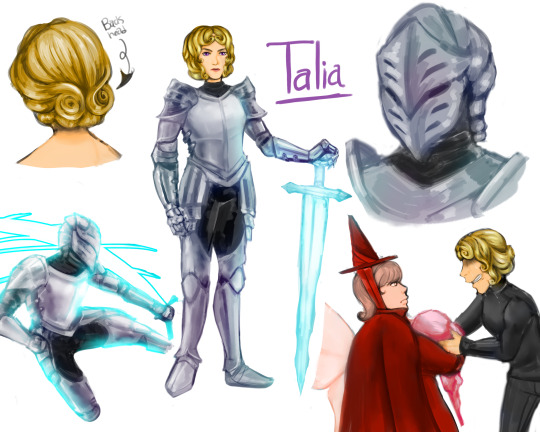
A general knight part of Philyra’s kingdom
#twisted wonderland#disney twisted wonderland#twst oc#twisted wonderland oc#my art#twst queen Leah#sleeping beauty
59 notes
·
View notes
Text
My favorite thing is how fan artists have begun drawing Magnus as black after Leah began playing Annabeth
#I ADORE IT#THE DESIGNS THEY MAKE ARE BEAUTIFUL#Leah my beloved#that’s my Annabeth right there#Magnus chase#mcga#pjo#annabeth chase#them !!!#the siblings !!! (they’re cousins but my point still stands!!!#somnas.rambles
23 notes
·
View notes
Text
SLEEPING BEAUTY PARENTS BACKSTORY
I've said a lot of this before here but i'll go over it again for the sake of the post
Stefan grew up a ward of the Fairy King and Queen, a young mortal infant they found abandoned in the woods and took under their literal wings
His caregivers during this time were the Three Good Fairies, favored handmaidens of Queen Titania
He had a happy and mostly carefree childhood, not venturing beyond the Veil of the Fairies until he reached young adulthood, when he began wandering the edges of the forests that touched on the kingdom of Perceforet
And it was during one of these excursions that he met the beautiful young princess Leah, who'd snuck away from the castle to enjoy the beauty of the woods in spring

Though Leah was initially startled by the strange young man who appeared from the forest, she soon lost her fear as she saw how kind and courteous he was, and the two began to meet frequently at the woods edge, their friendship growing into love.
Eventually though their trysts were discovered, and Stefan was taken before Leah's father, King Florestan, who demanded to know just who Stefan was who dared to court his daughter
Stefan confidently declared himself the foster son of Oberon, and though this caused the king pause, for he didn't want to risk offending the Fairy Court, he still felt Stefan wasn't a desirable suitor for Leah's hand, as he could be any commoner's son by birth
And so King Florestan declared that if Stefan wished to prove himself worthy of Leah's hand he must accept to undertake a quest--a traditional challenge that he was within his rights to give without risking offense from Stefan’s guardians--and if he succeeded then he would win Leah's hand and the throne as well, as Florestan had no sons (he wasn't the most progressive king but it was the 14th century)
Stefan agreed, and Florestan tasked him with a quest he was sure would be impossible
Somewhere within the land of Percefort there lives a devilish imp with golden hair, known for his dark bargains and darker powers. Stefan must find the imp's lair, break into it, and steal three golden hairs from the imp's head. All without being cursed and or killed by the imp of course--and he must do so before the next full moon
Stefan has heard of this being from hushed whispers in the Fairy Court. He knows how dangerous the task will be but determines to accept it anyway.
It was at this time that Stefan would meet someone who would become his lifelong friend, the King Hubert of Ulstead, and his wife Queen Isolde. Hubert had been visiting the neighboring court of Florestan and was impressed with what he saw of Stefan, and determined to help him on his quest

The two traveled together through the darkest parts of the forest, fighting savage beasts and overcoming challenges that fell in their way, searching for the lair of the golden haired imp
At last they discovered it, a strange warped place, like a canker in the darkest heart of the forest
During all this time Stefan has managed to overcome with his wits/Hubert's help, as he was told by his foster father before heading off that he would need to fulfill this quest on his own without the magical aid of hia caregivers to prove his worthiness--but now he comes to an impasse
The imp's lair is protected with deeply potent magic, and thats still only the outside. If he's even able to get in Stefan has no real idea what challenges the imp may provide
With time running out, Stefan finally resolves to try his luck with a loophole. He knows he's not meant to ask for magical aid from the Court. But he knows one person who had never truly been part of it. One person who's magics could be a match for the Imp's protections--his foster cousin Melisandre
He summoned her and explained his need, and she agreed to aid him in his quest, under the conditions that he would make her his royal sorceress once he gained the kingship after marrying Leah
(Unbeknownst to Stefan, or indeed anyone in the Fairy Court, Melisandre had long since fallen to evil and looked to become a dark influence upon the human kingdoms with this appointment)
Due to being half-demon herself, as well as very powerful, Melisandre was able to work her way through the wards of the Imp, and using her wits and wiles managed to charm him upon his discovering her. Soon enough, she had him in a state of stupor and was able to this way gain the three golden hairs without his knowledge, sneaking back to Stefan before the Imp awoke
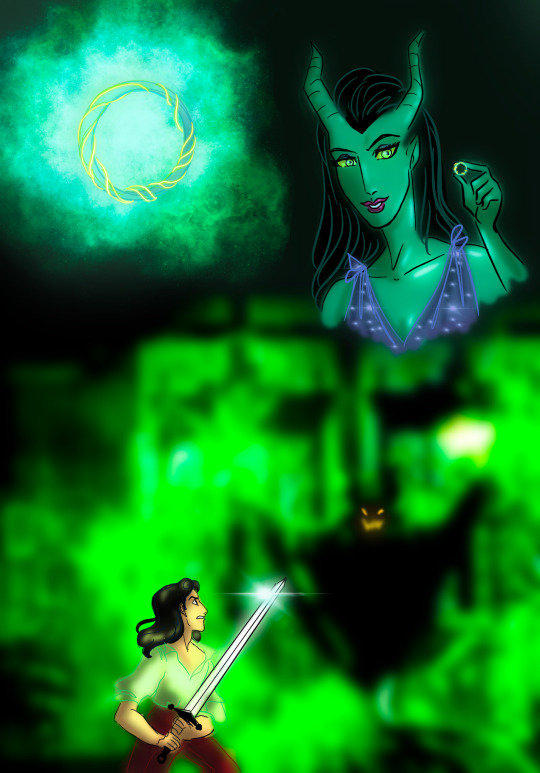
Stefan traveled back to Perceforet and just in time presented the three hairs to Florestan, who was shocked but bound to his word, and betrothed Leah and Stefan to be wed the following fortnight
However all was not yet well. Melisandre had long carried a grudge against her aunt the Fairy Queen Titania, and decided at last to take her vengance through harming her husband King Oberon
Taking the three hairs of the Imp, which she asked Stefan to grant her and he agreed thanks to her help, she crafted a ring which would drain the life from Oberon slowly, and had it presented through a third party to her uncle
Stefan however, recognized the make of the ring, and linked it with his foster father's illness, but before he could raise an alarm Melisandre reminded him that she had aided him in his quest, going against the Fairy King's express wishes. If he kept his silence then none would know of his deception and Leah would remain his.
Stefan realized the truth of these words, but ultimately decided he could not stand by as his foster father faded away and the fairy court plunge into chaos
He revealed his intrigue with Melisandre and her actions taken against the crown
Titania tried to take Melisandre into custody once her betrayal was revealed , but her magic prevented her capture, and she turned upon the Fairy Queen intending to destroy her
Stefan however in his moment of integrity proved worthy of wielding the Sword of Truth, Oberon's sword which could only be wielded by a worthy hand and turned it against Melisandre, stopping her attack and casting her from the Court
Melisandre fled, her access to the Fairy Court revoked and a new name of derision given to her, Maleficent
Oberon's life had been saved, but he was still gravely ill, and was forced to draw deeper into Faerie to recover, Titania going with him, but granting Stefan their thanks and forgiveness before they did, promising that he and his family would always remain friends of the Fairy Court
Stefan then told the truth to Florestan and Leah, but Leah refused to break the engagement, arguing that Stefan had now proved himself twice over and asserting her intention to have none but him as her husband
And so the two were wed, (though they had some trouble from the vengeful Imp keeping them from having a child for many years and the vengeance of Maleficent when they finally did) and lived happily ever after
(Credit to Arthur Rackham for the top picture)
#my art#disney#Disney Parent Backstory#DisneyVerse#disney sleeping beauty#sleeping beauty#Maleficent#king stefan#queen leah#rumplestiltskin#the devil with the three golden hairs#brothers grimm#fairytales#disney parents#prince philip#king hubert#queen titania#oberon#arthur rackham
61 notes
·
View notes
Text
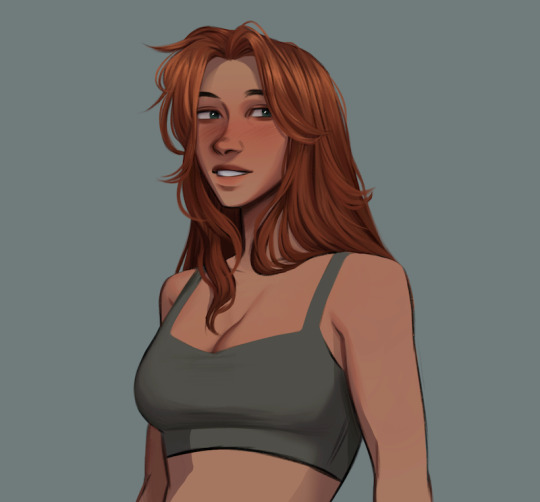
my oc Leah ! she's goin through a lot but she tries her best to be a force of positivity!
#sketches#my ocs#oc artwork#lloyds ocs: leah#character design#she has pretty constant anxiety that she's taking up space and is just being tolerated by people#so she tries to be funny and extra bubbly to “be likable” and to pretend like she isn't insecure#she has a very early trauma of feeling disposable#and even though she's gained more peace and more confidence as she's grown up she never really lost that fear that she's secretly worthless#in reality she's genuinely beloved by the people that matter to her#she has a beautiful soul and i love her hhhh#she's also crazy good at fighting with a staff so WATCH OUT
18 notes
·
View notes
Text
me and my brother are constantly arguing about this so i'm going to settle it
#stardew valley#harvey sdv#stardew harvey#harvey stardew valley#leah sdv#stardew leah#leah stardew valley#imo harvey's better because his love for you feels so much more genuine#average harvey dialogue is like “i love you so much my beautiful wife you're my everything”#and leah's is just “I saw a rabbit today :) anyways i'm going to go look for mushrooms now”#idk i just love how affectionate and caring harvey is like he's so sweet
15 notes
·
View notes
Text
GUYS- I WATCHED THE FIRST TWO EPISODES OF THE PJO SERIES AND I- OH MY GODS IT'S AMAZING.
#I have seen some things that say that Gabe wasn't really “back enough to be turned into stone” material and tbh I have to agree-#UGH BUT LEAH DID SUCH A BEAUTIFUL JOB PLAYING ANNABETH OH MY GODS#Annabeth is the one who has a plan#Percy is the one that confusingly follows the plan#And Grover makes sure none of them die while they do the plan#I love them <3#percy jackson#PJ tv show#Annabeth Chase#grover underwood#leah jeffries#walker scobell#aryan simhadri
11 notes
·
View notes
Text
youre welcome to whoever follows me for clogging up your fyp with annabeth chase artwork <3 your eyes have been blessed by my daughter now do feel free to go about your day
#annabeth chase#leah sava jeffries#went hunting in the annabeth chase fanart tag for some good show accurate fanarts of my child because I LOVE HER#sadly there were a lot of fairly light-skinned ones that were great but not accurately showing the lovely beauty of our very own leahbeth#(or ones that were literally just a white person but with the colors swapped out 💀💀)#(like yall do realize that you gotta make the features different too right)#i get that people have different 'styles of art' and that art is a long and arduous process!!#but its also important to maintain integrity when representing lovely darkskinned characters like annabeth that often do NOT get appreciate#and i dont believe just blanket white features and such is a 'style of art' like sure thats what we've been taught is the standard of beaut#but that doesn't mean that artists too can't change and learn and adapt their styles to lots of different beauties#anyways didnt mean to go on a mini rant sorry#MUCH LOVE TO ANNABETH FOR BRIGHTENING MY LIFE#AND LEAH
8 notes
·
View notes
Text
i am once again asking you guys to let people have opinions and be critical of taylor and act normal about it.
#girl let me say the merch is ugly#clearly taylor doesn't have a gun to my head and isn't making me buy it#but it's still ugly lmaooo#i'm laughing god some of y'all are way too far up her ass#i promise you taylor isn't even online to see me say it's ugly#and even if she were#she'd like like 'awe. anyway' LIKE?? lmao#she'd see those who DO like the merch filling her bank account and move on#also beauty is in the eye of the beholder or whatever#what YOU like and what I like are different and that's okay!#that's all bye#leah rambles#fandom wank
48 notes
·
View notes
Text
When Lucy returned to school for the spring term, Peter sent a war poem. It dropped from the crease of his letter into her lap, as unexpected as a firebomb.
“On Receiving News of War,” the title read, and Lucy’s heart lurched. She was sixteen and Peter was twenty-one. The war had ended three years ago and he had only been a British soldier for a matter of months before he was discharged. Now, this poem came: words from the Last Lot, the 1914 war. Lucy picked up the loose page and read.
ON RECEIVING NEWS OF THE WAR
Snow is a strange white word;
No ice or frost
Have asked of bud or bird
For Winter's cost.
Yet ice and frost and snow
From earth to sky
This Summer land doth know,
No man knows why.
She looked up in shock. What did Peter mean in sending this? Was it only that it made him think of their first days in Narnia, white and frozen under the White Witch’s curse? He could not have missed the title. Lucy worried her lip between her teeth, considering. Her brother did not often use words idly.
Red fangs have torn His face.
God's blood is shed.
He mourns from His lone place
His children dead.
O! ancient crimson curse!
Corrode, consume.
Give back this universe
Its pristine bloom.
Oh. Yes, alright. That made a certain kind of sense. And there, at the bottom of the page, was a single line writ in Peter’s hand. “Variations on a theme,” he had written, “only I’m not yet certain what theme it is. Do you have an idea?”
Several, in fact. Lucy’s mind lit up in an instant, all a-whirl with memory and typology. She wasn’t a child any longer, and in small bits her many battles came back to her. Peter, she was sure, remembered even more of Narnia’s wars.
Yet Lucy remembered the ice of Lantern Waste on the first day as though no time had passed at all. She remembered the crimson of Aslan’s blood. She remembered the thaw. In her mind, those things had nothing and everything to do with Britain’s last war. Nothing: the two worlds were as different as King Arthur and Winston Churchill. Everything: because maybe Arthur and Churchill were not so different after all.
That night, after a trip to the library and with a book of poetry on her desk, Lucy composed her reply. “Another variation,” she wrote, and carefully copied out the lines.
All the dead kings came to me
At Rosnaree, where I was dreaming,
A few stars glimmered through the morn,
And down the thorn the dews were streaming.
And every dead king had a story
Of ancient glory, sweetly told.
It was too early for the lark,
But the starry dark had tints of gold.
The poem was called “The Dead Kings.” Peter was not dead, but Lune was and Cor was. Caspian was. It was easy to imagine them appearing in the trenches and whispering their stories into the ears of British soldiers.
“Caspian would have liked the notion, I think,” Lucy said thoughtfully.
Peter leaned back in his chair and smiled. “Yes. Come to think of it, I rather like it myself. If I were the dead king, I mean.”
“It’s strange—I think these were meant to be sad poems, the way they were written. The world unwillingly cursed and the ancient kings dead. Yet when you apply it to Narnia, I don’t think it’s terribly sad at all. Maybe a little melancholy, but hopeful too. Like I know something that the poet doesn’t.”
“You do know something that the poet doesn’t,” answered Peter.
“I mean about war and dying and all. It’s all so distant for me, you know? And yet I often suspect that I know secrets that some men who actually fought couldn’t guess at. The hopeless men, maybe. In Narnia it was all more beautiful. Having lived there elevates even war and death, in this world.”
“We were, both of us, soldiers once.”
Lucy nodded.
“How about this one, then?” Peter shoved his book across the table, nearly upending the cream along the way.
The drab street stares to see them row on row
On the high tram-tops, singing like the lark.
Too careless-gay for courage, singing they go
Into the dark.
“Simple,” said Lucy. “Singing on the way to war is courage. Singing in the dark is just about the bravest thing a person can do. Just because these boys go into the battle without knowing what it’s really like doesn’t make them any less brave for going, or for singing.”
“You would know,” her brother smiled fondly.
With tin whistles, mouth-organs, any noise,
They pipe the way to glory and the grave;
Foolish and young, the gay and golden boys
Love cannot save...
“It makes me think of Susan,” Peter murmured.
“I can see that. Our love cannot save her, only Aslan’s.” Lucy frowned thoughtfully.
“No, no—I mean I wonder if that’s how Susan thinks of us: foolish children still playing games where singing in the dark means anything at all. Gay and golden, but naïve and careless by the same token. Too caught up in notions of courage and glory to realize that we live in a world where good people die.”
“Oh Peter, you don’t really think?”
“She told me once she’s afraid that we’ll never grow up, did you know? I wondered if she meant that we would always be like children, or if she worried we might die young. Sometimes I still wonder.”
“It wouldn’t be the worst thing in the world,” said Lucy. “To always be child-like, or even to die young. Not by half.”
Peter snorted. “You might not mind dying young, but I’d certainly mind it. You’re my little sister, Lu. If you die young, it means I’ve done something wrong.”
“Well of course I’d mind! There are so many things I mean to do once I’m grown up. But I’ve always thought—ever since Father Christmas handed me that dagger—that I might. As long as I died for something, it wouldn’t bother me. I think I could be a rather good martyr.” She winked across the table.
“Don’t you dare. If Aslan has short lives in mind for either of us, we’ll drink what we’re given. In the meantime, let’s both of us focus on growing up well.”
The next week, Lucy went with Marjorie Preston to the mail room. It was Marjorie’s birthday and she was expecting a parcel from home, but Lucy was also privately hoping for another letter from Peter.
An abundance of riches awaited Marjorie: an enormous box that the two of them had to lift together. Thus, Lucy tucked Peter’s letter under one of the box’s flaps as they carried it, and it was Marjorie who tore open the envelope when they reached the dormitories.
“What in the world is this?” Marjorie exclaimed, waving a poem under Lucy’s nose. Lucy snatched it away and hungrily read the words, considering how this variation fit Peter’s theme. Then, she noticed that Marjorie was still beside her, tapping her foot impatiently.
“My brother sends me war poems,” Lucy explained hurriedly.
“That’s strange.”
“Do you think so?” Lucy considered. “Well, no matter.”
WAR GIRLS (here Peter had added “& VALIANT QUEENS”)
Strong, sensible, and fit,
They're out to show their grit,
And tackle jobs with energy and knack.
No longer caged and penned up,
They're going to keep their end up
Till the khaki soldier boys come marching back.
"Does he mean you?" asked Marjorie, wrinkling her nose.
Lucy laughed, but didn't dispute it. She went to fetch some paper and a pen.
On they went for the next several months, passing poems back and forth in their letters. Some of them were hopeful and some despairing, some sad, some darkly funny. It was a dialogue in a war that Peter scarcely remembered, and Lucy even less. In time, Tennyson and others from before the Last Lot worked their way in. Even Shakespeare made an appearance with several selections from the Henriad. Spring lurched into summer which tumbled into fall. Peter turned twenty-two in August and Lucy was seventeen in November.
Then, at dinner at Professor Digory’s house one night, the specter of a Narnian king appeared before them. Before they left, Peter found the poem he was thinking of in the Professor’s study and gave it to Lucy.
Horror of wounds and anger at the foe,
And loss of things desired; all these must pass.
We are the happy legion, for we know
Time's but a golden wind that shakes the grass.
“Does it feel different this time?” he asked once she had read it.
“Yes,” replied his sister, “and no. It feels obscurely like it did the night Aslan died. Like something is hanging over us.”
“I think this is the end,” Peter said bluntly. “He said we wouldn’t ever go back to Narnia, yet here we are. It feels like the end. Do you remember what it was like the night before a battle?”
“Yes. I didn’t before, but I do now. Like we had to gather up everything inside ourselves and name it. Fear and courage, love and memory.”
Peter sighed. “We ought to get going. There might be ice on the roads tonight.”
Lucy went into the closet and fetched her coat. Peter followed, moving a fraction slower than usual.
“Peter?” Peter turned and looked at Lucy, who was standing in the doorway with her fur-trimmed collar turned up around her throat. “It was a good poem, Peter. The right poem. Time’s but a golden wind that shakes the grass…”
Golden. Golden like Aslan’s mane, which they both so dearly longed to touch once more. Lucy tossed the poem round and round in her mind all that evening.
Before he and Edmund left for London, Lucy slipped an envelope into Peter’s pocket. “Read it on the train,” she told him.
Peter nodded. “I have one for you too.”
It was the last conversation they shared in the Shadowlands, though neither knew it at the time.
When Lucy unfolded her poem, she recognized the words. It was her favorite war-poem, which she’d first sent to Peter months ago when their correspondence had begun.
Sombre the night is:
And, though we have our lives, we know
What sinister threat lurks there.
But hark! Joy—joy—strange joy.
Lo! Heights of night ringing with unseen larks:
Music showering on our upturned listening faces.
It almost made her want to giggle, how well Peter knew her. Lucy thought of him and Edmund together in London; she ached for Susan, who had chosen not to join her siblings in their last battle for Narnia. She breathed in deep and thought of music on the way to war.
Death could drop from the dark
As easily as song—
But song only dropped,
Like a blind man's dreams on the sand
By dangerous tides;
Like a girl's gold hair, for she dreams no ruin lies there,
Or her songs where a lion hides.
That last couplet was wrong. Peter had changed it. The poem ended with, A girl’s dark hair and kisses where a serpent hides, but Peter had written gold and lion instead.
When Peter unfolded his own poem on the train, he found only a single stanza, annotated on nearly every line.
It didn’t pass— (His will be done) it didn’t pass- (His will be done)
It didn’t pass from me.
I drank it when we met the gas (His will be done)
Beyond Gethsemane! (His will be done)
The train halted and the whistle blew. Peter shook Edmund awake beside him, and together they went to unbury the rings.
.
Poems referenced: “On Receiving News of the War,” Isaac Rosenberg; “The Dead Kings,” Francis Ledwidge; “Joining the Colours,” Katharine Tynan; “War Girls,” Jessie Pope; “Absolution,” Siegfried Sassoon; “Returning, We Hear Larks,” Isaac Rosenberg; “Gethsemane,” Rudyard Kipling
#i really am very interested in the ways that Narnia relates to both ww2 and ww1#but i almost never like the way other people address the subject#(sorry)#so here's my attempt#i'm not 100% satisfied with it but i think it's good enough for now#the beauty of using a cut is that i can still revise if i decide i want to#also this is part of my informal 'Narnia lit analysis series'#because that's just the kind of gal i am#narnia#dear darling heart-daughter of aslan#high king over all the rest#chapter one#martyr club relevant#leah stories#pontifications and creations#intertextuality
65 notes
·
View notes